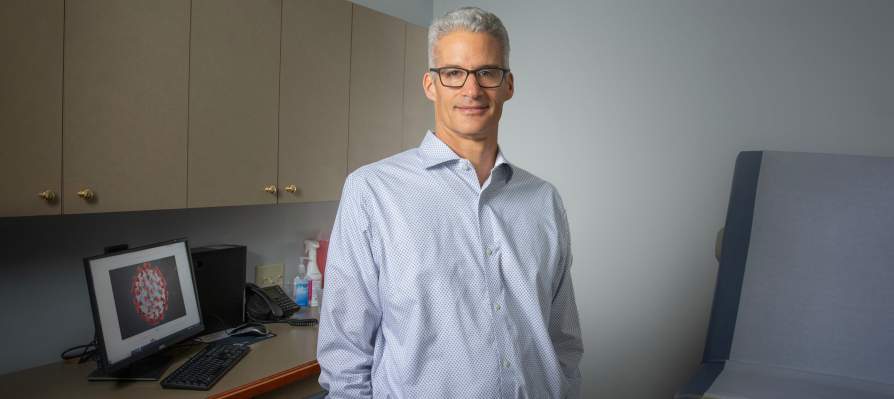By Annette Pinder
A UB clinical trial is seeking 50 adults ages 18 to 80 who have long COVID to participate in a clinical trial to test low-dose lithium as a potential treatment for their symptoms. Thomas J. Guttuso Jr., MD, of UBMD Neurology and a professor with the Jacobs School of Medicine and Biomedical Sciences is the principal investigator.
The placebo-controlled trial, which is examining the effects of low-dose lithium therapy on long COVID symptoms, is double-blind, which means that some patients will receive the treatment, and others will receive an inactive placebo. However, after 21 days, all patients will be able to receive the lithium treatment.
Knowing that long COVID is believed to stem from chronic inflammation, and that lithium has known anti-inflammatory actions, Guttuso wanted to see the effects of administering a low level of lithium to a patient. “I was shocked when the patient improved within a matter of days,” says Guttuso. Since then, he discovered that researchers in Spain had published findings revealing that patients who were already taking lithium for bipolar disorder, and who were infected and hospitalized with COVID-19, had better outcomes than those not taking lithium.
When other physicians heard of Guttuso’s success, they began referring their patients with long COVID to him. Eventually, he was treating 10 additional long COVID patients with low-dose lithium. Nine patients saw improvement, and no patients experienced side effects. Within days, patients were improving. Some said their symptoms didn’t come back, even after they stopped taking lithium, while others needed to keep taking it.
One patient, Jennifer Stewart of East Amherst, had a mild COVID-19 infection in January 2022, with few symptoms other than brain fog and intense fatigue, which persisted for months.
“I’m a really energetic person, I never nap, and here I was taking naps in the middle of the day. I even slept through a Bills game I was going to watch. That’s how bad it was,” says Jennifer.
After giving Stewart a thorough exam, Dr. Guttuso mentioned the outcomes he was seeing in patients taking lithium. “He explained that it was such a low dose, it was the equivalent of taking a mineral like calcium or magnesium,” says Stewart. When he told her that it takes about four days to begin working, she said, ‘Wow, that’s fast.” However, she saw results within two days, and her strong need for a nap disappeared. Stewart stopped taking lithium a few weeks later, and her symptoms have not returned. When asked what advice she has for others with long COVID, Stewart doesn’t hesitate. “Why on earth wouldn’t you enroll in this trial?” she says. “My symptoms are completely gone.”
The clinical trial is being funded as a pilot project by UB’s Clinical and Translational Science Institute. Anyone with long COVID symptoms is also invited to participate in UB’s Long COVID registry. To learn more, call 716-829-5454.











